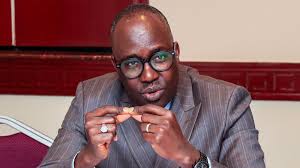
Kenya and
Sudan have moved to deescalate diplomatic tensions after months of hostilities.
The efforts have been rolled out following a meeting between
Foreign Affairs PS Korir Sing’Oei and Sudan Embassy Charge' d'Affaires Mohamed Akasha.
Akasha started acting as ambassador after Port Sudan severed
diplomatic ties with Nairobi in February and recalled its envoy, Kamala Jabara.
Port Sudan was protesting against Kenya’s move to host rebel
outfit Rapid Support Forces.
PS Korir said he had assured Akasha that Kenya’s role in Sudan
has always been guided by the desire to see a peaceful and united country in
the spirit of solidarity and mutual respect.
“I am grateful for the willingness to engage in order to
forge a better understanding necessary for genuine cooperation,” Korir said.
This came days after the latest war of words between the
two countries early this month.
In a strongly worded statement by the Office of Prime
Cabinet Secretary and CS for Foreign Affairs, Nairobi accused the junta
government of scapegoating Kenya for its internal woes.
Kenya told off the Sudan Armed Forces, who had accused
Nairobi of backing the rebel Rapid Support Forces. SAF also accused Kenya of
being the main conduit of the Emirati military supplies to RSF.
Kenya considers the continued and unsubstantiated
allegations by the SAF (Sudan Armed Forces) administration to be not only
regrettable but also inconsistent with the principles of good neighbourliness
and mutual respect that underpin the Charter of the United Nations and the
Constitutive Act of the African Union.
“Such reckless actions risk undermining regional peace and
stability, and are unbecoming of the fraternal Pan-African relations
traditionally shared among states in the region,” the statement, signed by
strategic communication secretary Peter Warutere, said on Thursday.
Nairobi denied the allegation that it is backing RSF and
arming the rebel group, saying it upholds its obligations under international
and regional frameworks and does not condone, facilitate, or engage in the
illicit trade or smuggling of arms.
“Unfortunately, no amount of scapegoating or repeated
blaming of other states will alleviate the suffering of the Sudanese people. It
is time for the parties to the conflict in Sudan to assume full responsibility
and commit to restoring civilian rule, peace and security for the benefit of
the Sudanese people and the wider region,” the statement said.
There have been previous attempts to mend the ties, which haven’t
been successful.
Sudan’s former Foreign Minister Ali Youssef Ahmed in January
visited Nairobi and held talks with President William Ruto and PCS Musalia
Mudavadi.
The two sides agreed to continue dialogue and cooperation
through the revival of the Joint Commission for Cooperation and resume the work
of the Joint Ministerial Committee.
Minister Youssef admitted there were hiccups in the
diplomatic relations between the two states, referring to Sudan’s recall of its
envoy in Nairobi after President Ruto hosted RSF leader Mohamed Dagalo Hemedti
in Nairobi in January last year.
Sudan Armed Forces had also rejected Ruto as the
IGAD Mediation Quartet head, accusing him of being pro-RSF and harbouring its
elements in Nairobi.
“Our meeting in Rwanda was the turning point in our approach
in our relations. So we are here to work on our bilateral relations, and this
means reviving the Joint Ministerial Committee,” Youssef said in Nairobi.
Mudavadi said Kenya wants peace to be restored
in Sudan “so that the economic partnership that has always been there can
return”.
“As we go forward, because building trust and confidence after such a challenge is not easy, we will be happy to support you and walk with you as the measures you continue to put in place in your country continue to take root,” Mudavadi said.















